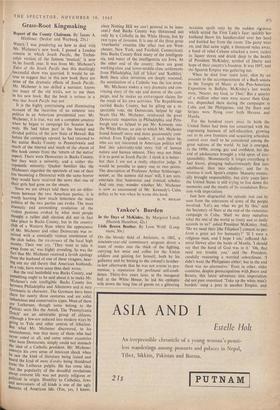Grass-Root Kingmaking
WHILE I was pondering on how to deal with Mr. Michener's new book, I passed a London cinema in which South Pacific, the Techni- color version of the famous 'musical,' is now in its fourth year. It was from Mr. Michener's ?iales of the South Pacific that this dazzlingly fuccessful show was quarried. It would be un- true to suggest that in this new book there are none of the dramatic effects of South Pacific. Mr. Michener is too skilled a narrator, knows too many of the old tricks, not to use them in his new book. But the book is serious in a way that South Pacific was not.
It is the highly entertaining and illuminating account of the incursion of an amateur into politics in an American presidential year. Mr. Michener, it is true, was not a complete amateur when he began to campaign for Senator Ken- nedy. He had taken part in the heated and divided politics of the new State of Hawaii. But before the campaign opened, he had returned to his native Bucks County in Pennsylvania and much of the interest and much of the charm of this book comes from the 'return of the native' aspect. There were Democrats in Bucks County, but they were a minority, and a rather dis- reputable minority. Quaker families like the Micheners regarded the spectacle of one of their kin becoming a Democrat with the same horror they would have received the news that one of their girls had gone on the streets.
Since we are always told there are no differ- ences between the two American parties, it is worth learning how much bitterness the mere politics of the two parties can evoke. The most dramatic and astonishing revelation of the violent passions evoked by what most people thought a rather dull election did not in fact take place in Bucks County, but in the country club of a Western State where the appearance of Mr. Michener and other Democrats was re- ceived with a comically vicious resentment of the club ladies, the tricoteuses of the local high society. Their war cry, 'They want to take it away from us,' was highly revealing. So was the fact that Mr. Michener received a lavish apology from the husband of one of these viragoes, bear- ing out my old theory that American husbands, as a rule, have more sense than their wives.
But the real battlefield was Bucks County, and something ought to be said about it to make Mr. Michener's role intelligible. Bucks County lies
between Philadelphia and Allentown and is very Germanic in character. The Germans have been there for nearly three centuries and are solid, industrious and conservative types. Most of them are Lutherans, though some belong to the Pietistic sects like the Amish. The 'Pennsylvania Dutch' are an admirable group of citizens, although a few,are seduced into modern ways by going to Yale and other centres of infection. But what Mr. Michener discovered, to his astonishment, was that many of them who had never voted at all, and some minor eccentrics who were Democrats, simply could not stomach the idea of a Catholic president. Mr. Michener
conveys his own sense of innocent shock when he saw the kind of literature being issued and
heard the kind of mots d'ordre being thundered
from the Lutheran pulpits. He has some idea that the popularity of the dreadful revelations, about convent life was not purely religious or Political in origin. Hostility to Catholics, Jews and newcomers of all kinds is one of the ugly features of American life. (Yes, yes, I know; since Notting Hill we can't pretend to be inno- cent.) And Bucks County was threatened not only by a Catholic in the White House, but by two types of invasion. It is one of the three great 'exurbanite' counties (the other two are West- chester, New York, and Fairfield, Connecticut). Into Bucks County flock many of the intelligent- sia, and many of the intelligentsia are Jews. At the other end of the county, there are great working-class and lower-middle-class settlements from Philadelphia, full of `kikes' and `Kathlics.' Both these alien invasions are deeply resented; the nomination of a Catholic was the last straw.
Mr. Michener makes a very dramatic and con- vincing story of the ups and downs of the cam- paign, and he makes no extravagant claims for the result of his own activities. The Republicans carried Bucks County, but by piling up a re- spectable vote, the Democrats, helped by egg- heads like Mr. Michener, reinforced the great Democratic majorities in Philadelphia and Pitts- burgh and so helped to put Mr. Kennedy into the. White House, an aim to which Mr. Michener found himself more and more passionately com- mitted. Even English readers, if such there be, who are not interested in American politics will find this admirably-told story full of human nature and human interest. They may not think it is as good as South Pacific. I think it is better: but then 1 am not a really objective judge. It would be possible to query one or two points. The description of Professor Arthur Schlesinger, senior, as 'the austere old man' will, I am sure, entertain that humorous and ironical scholar. And one may wonder whether Mr. Michener is now as enamoured of Mr. Kennedy's Cuba policy as he was when he wrote this book.
D. W. BROGAN










































 Previous page
Previous page